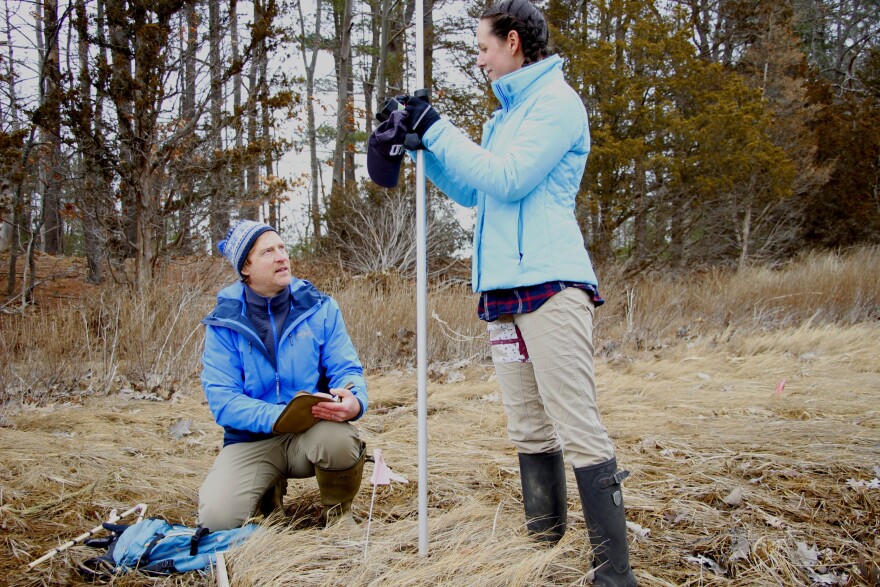Salt marshes are an integral part of New England’s coastal ecosystem, but the erosion of some marshes is affecting their ability to protect habitats and humans.
Now, researchers at the University of New Hampshire are studying how climate change is affecting the condition of salt marshes near the Seacoast, and what can be done to help.
Associate professor of biological sciences Gregg Moore is leading that team. Along with graduate and undergraduate students, they’re trying to understand how the marsh operates and what could help stabilize it.
On a frigid March day, Moore treks out to a marsh in Durham with two students. A tinge of sulfur lingers in the air, a smell that Moore said is common to marshes. Closer to the treeline, the marsh looks solid, and is coated with a yellowish grass. Farther out, in the low marsh, it’s darker and looks more spongy.
“Over the last ten years that area of flooded marsh has been growing,” Moore said, gesturing toward the water sitting on the low marsh. “What used to be little small depressions or pans with water in it have started to all link together.”
Salt marshes act like buffers for coastal communities during big storms. But when the marsh gets saturated, that buffering effect doesn’t work as well as those pans of water Moore mentioned link together. That saturation is happening more often because of sea-level rise due to climate change.
These conditions change plant life in the marsh. Roots can’t hold on and the land breaks apart. Plants and wildlife have less habitat available, local ecosystems are disrupted and less protection from storms are provided for property and people.
“You get more coastal flooding, whether it's on your property or a parking lot or just an adjacent upland,” Moore said. “The plant communities are changing and the threats that get created from that become more and more serious.”
Walking farther out, the flooding in this salt marsh is palpable. The ground has a lot more give to it. Moore says it’s important to watch where you step.
“This site has been a site where almost every one of my students has either needed an extraction… or lost a boot…” Moore said.
As he was growing up, Moore said it was uncommon to find places where one could just fall through the marsh – an indicator that the “natural, healthy, typical” salt marshes of his youth are disappearing. Ten years ago, a student would have to walk a lot farther out into the marsh before sinking, Moore said.
As a part of their research, Moore’s team is trying to develop ways to mitigate or reverse the damage to salt marshes. They’ve been conducting an experiment over the past few years using sediment. They built several small enclosures that look like small raised garden beds, and in each one, they deposited sediment of varying depths and tracked how well plants in the marsh responded to it.

“We wanted [to figure out] what would work or maybe what would push the system too far or what would be the Goldilocks moment, right? Where we got it just right,” Moore said.
It seems the “Goldilocks moment” occurred in the beds with the deepest sediment. Those fortified the marsh the most, helping it to gain height, instead of sinking. The sediment allowed the grass in the marsh to build a robust system of roots, which holds on to the marsh and allows it to remain stable instead of getting washed out to sea.
This practice, spreading sediment on a marsh for preservation, is used in many places across the country, but not in New Hampshire. Because of tight restrictions on how marshlands can be used or modified, Moore says he had to get approval under the Federal Wetland Protection Act for even the small plots he and his students constructed on the marsh.
“Through the results of this pilot, we hope to inform decision-makers to understand whether or not [spreading sediment is] going to be a feasible alternative in certain situations,” Moore says. “We know it's not a one-size-fits-all, and that's just a reality of this kind of work. But the scale that we're doing at is tiny within the ecosystem we're working in.”
Moore says it’s possible that scaling up the sediment project could help the marsh build up resilience to further flooding and erosion. That kind of work takes a lot of time and effort, but it could prevent the marsh from meeting the same fate as another nearby marsh, where there are almost no plants left. The wildlife habitat is gone, the storm and flood protection benefits are minimized. Now, it’s essentially a mudflat.
“For almost as far as they eye can see,” Moore said.
Large scale sediment work to protect salt marshes is being done nearby in Rhode Island. For now that’s not happening in Massachusetts, Maine or New Hampshire, but Moore says that could be changing soon.









